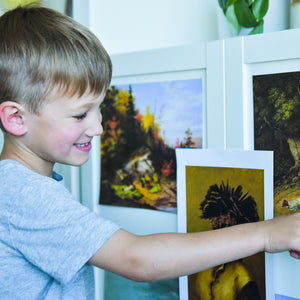Nine Homeschool Myths Debunked: Homeschool Myth #1: Socialization

Homeschooling is not a neutral topic. People have strong opinions about homeschooling, and our beliefs come from a variety of places. But are these beliefs fact or fiction, myth or reality?
Homeschooling has generally been an unpopular educational option, yet the number of homeschooled students has grown rapidly since 1970 and nearly doubled between 2019 and 2021 due to COVID concerns.1
Because many parents are concerned about homeschooling as a legitimate educational option, we conducted a poll of nearly one hundred experienced homeschooling parents and asked, “What were some of the things you believed about homeschooling before you started?”
The many responses fell into nine categories. These parents generally believed these nine points to be true before starting to homeschool and found them to be false or incorrect after homeschooling. They found these nine points to be MYTHS, and we are on a mission to bust them!
#1 Homeschooled children aren't properly socialized.
This is the most commonly held belief about homeschooled children, so let’s bust it first!
In our culture, peer-orientation is the socialization norm. It is “normal” for children to adopt the values of their peers, to seek inclusion with and attachment to peers, to place a high value on the opinions of peers, and to desire to spend a lot of time with peers. We look at children who behave in this way as socialized. However, socialization is actually defined as 1. “the activity of mixing socially with others” and 2. “the process of learning to behave in a way that is acceptable to society.”2
Because most children attend public school, a good amount of socialization naturally happens there. Certainly there are public schools with positive peer environments; however, more and more often, public schools do not offer such a safe social setting. Instead, many children find themselves in negative, even toxic situations where poor behavior is either tolerated, popular, or even acceptable. Some children are very mature and self-confident and not as vulnerable to the influence of such an environment, but children are impressionable and absorb the impact of these bad behaviors. A child can struggle to thrive when bombarded with negative messages through bad behavior.
On the other hand, a child will thrive when nurtured with positive messages through good behavior and social interactions, and a homeschool setting can be the perfect place for this. To be fair, though, a family-centered social environment will only have a better influence on a child if positive behavior is modeled and encouraged in the home; if children are exposed to activities and opportunities that foster healthy interactions with others; and if they are taught, including through example, how to disagree agreeably, how to tolerate and even embrace and celebrate differences, and how to treat others with respect, consideration, and kindness.
In typical homeschool families, children learn how to interact with others in a natural family setting, with their parents as the primary influences. While children who are homeschooled may not spend the same number of hours each week with their peers as those who attend public school, they still have many opportunities to socially mix with others in community classes, co-ops, church groups, and play dates. Furthermore, as more families are choosing homeschooling each year, even more social opportunities arise.
Unfortunately, because homeschooled children are socialized differently from their public school counterparts, others may falsely assume they are not socialized at all. However, socialization happens when children mix with others and learn acceptable behavioral norms, and homeschooled children certainly have these opportunities available to them, leading them to enjoy a normal, healthy, and happy social life.

Sources
1https://www.nheri.org/research-facts-on-homeschooling/
2(See “socialization” in Google’s English dictionary provided by Oxford Languages.)
- The Mindful Heart







